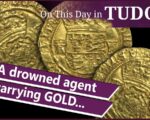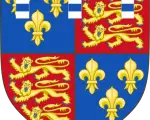
On this day in Tudor history, 28th November 1565, member of Parliament and political agent Francis Yaxley set sail for Scotland from Antwerp.
Sadly, Yaxley’s ship was wrecked in a storm and he never reached Scotland, and neither did the gold he was carrying to Mary, Queen of Scots.
But why was he carrying gold and who was it from? What happened to the gold?
Find out all about Yaxley, how he came to be traveling from Antwerp to Scotland, and what happened to him and the gold, in this talk…
[Read More...]

